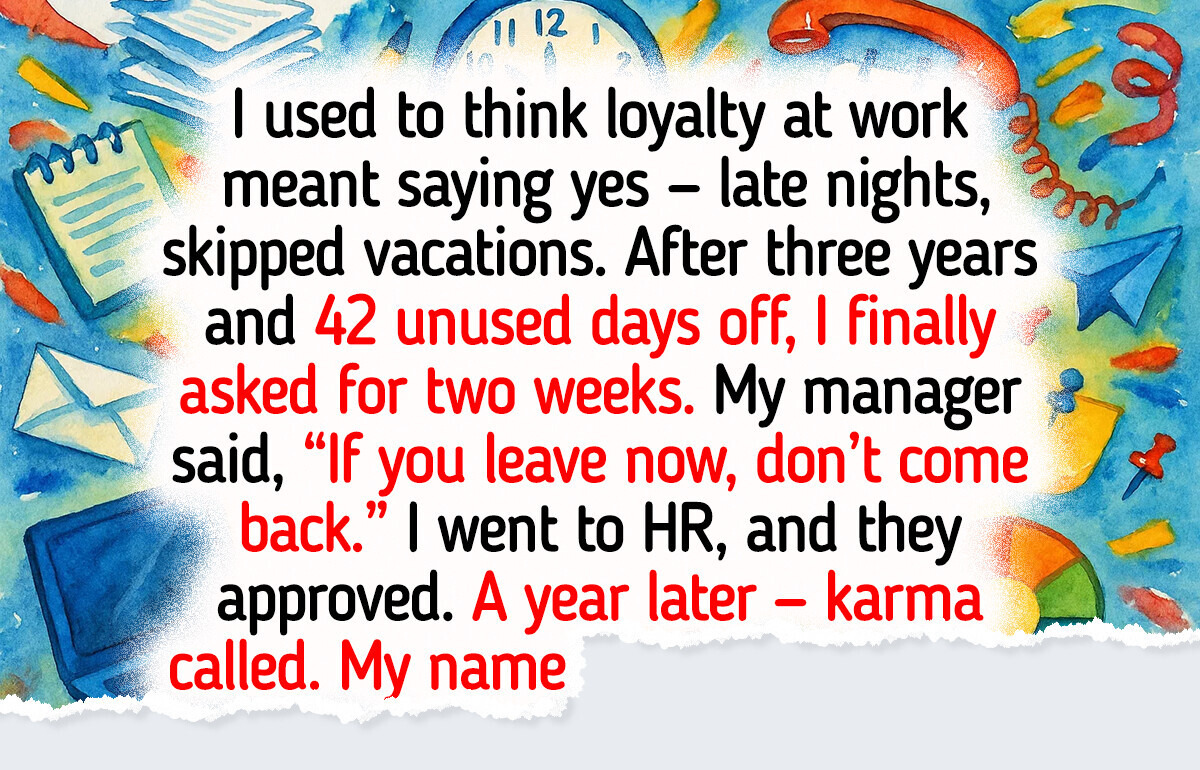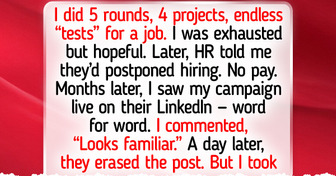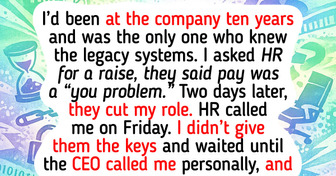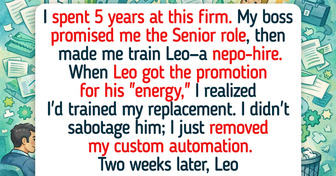I would start looking for another job, not every manager is this unappreciative and vindictive - take care
I Asked for a Vacation — It Turned Into Office Drama, and HR Is Involved

The letter:
Dear Bright Side Team,
I used to think loyalty at work meant saying yes — yes to late nights, weekend emails, and every “quick favor” that ate into my life. Three years in, I’d skipped vacations, missed my best friend’s wedding, and pretended the migraines were “just stress.”
Then one night, while finishing yet another “urgent” report at 1 a.m., I checked my HR portal out of curiosity.
42 unused vacation days.
So I asked for two weeks off. I wrote a perfect coverage plan, sent the email, and hit send.
Next morning, my manager called me in. No greeting. Just:
“Two weeks? If you leave now, don’t bother coming back.”
I thought he was bluffing — until he cc’d HR calling me “unreliable.”
So I forwarded every message where he’d said “next quarter” and “we really need you.”
A week later, HR approved my leave and reminded him that denying time off is, you know, illegal.
When I got back, the air was colder. No more “great job” emails, just silence and nitpicks. I worked harder anyway, thinking effort would fix it.
A year later, promotion day came. My name wasn’t on the list.
Same numbers. Same results. Just no recognition.
So now, I’m back drafting another email to HR — not to ask for vacation, but to ask why loyalty only counts when it’s one-sided.
Yours,
X.

When Your Boss Doesn’t Let You Take a Vacation.
So many people hesitate to use their vacation days because they’re scared it’ll make them look lazy or “less dedicated.” But here’s a reality check — no matter how loyal you are, no company is worth your health or peace of mind.
Rest isn’t a luxury. It’s part of doing your job well. Still, some managers talk about “unlimited vacation” like it’s a gift — and then act disappointed when you actually take it. That kind of guilt makes employees feel trapped, not trusted.
Honesty works better than fake flexibility. If your workplace offers a clear number of vacation days, you’ll know exactly what you can take — and your boss can plan for it. No guilt, no drama, just balance.
So next time someone says, “Take all the time you need,” ask what that really means. Because healthy boundaries don’t just protect your time — they protect your happiness, too.

7 Smart Tips for Asking for Time Off:
Know the rules before you rest.
Check your company’s PTO policy before you hit “book.” It saves you stress — and surprises.
Pick the right kind of leave.
Is it vacation, personal, or sick time? Clear requests get faster approvals.
Plan ahead (future you will thank you).
The more notice you give, the easier it is for your team to say yes.
Always put it in writing.
A short, polite email keeps things clear — and gives you proof if plans change later.
Offer a handoff plan.
Let your boss know how your work will be covered. It shows responsibility and earns trust.
Ask at the right time.
Skip the day-before-deadline drama. Choose calm weeks when your absence won’t add chaos.
Stay flexible.
If those dates are tricky, suggest alternatives. It shows teamwork — not entitlement.
✉️ Easy Examples to Copy and Use
Formal email:
“Hi [Manager], I’d like to request time off from [date] to [date]. I’ll wrap up all urgent work and coordinate with [colleague] while I’m away.”
Quick request:
“Hey [Manager], is it okay if I take [date] off? I’ll make sure everything’s handled before then.”
Emergency:
“Hi [Manager], I’m dealing with a personal matter and need the day off today. Thanks for understanding.”
Asking for time off isn’t asking for a favor — it’s caring for yourself. Rest isn’t a reward; it’s a right.
Comments
Sounds like it time for a new job. And a lawyer.
Related Reads
My Stepdaughter Wants Me to Pay the Bills Even Though I Babysit Her Kids for Free

I Passed 4 Tests for a Job, Got Ghosted by HR — They Used My Project, I Got Revenge

I Asked for a Raise After 10 Years and Lost My Job — They Didn’t See My Next Move Coming

I Refuse to Split My Inheritance Evenly Between My Grandchildren—My Son Is Furious

I Refused to Babysit My Sister’s Kids for Free, Now My Whole Family Is Against Me

I Refused to Let My 32-Year-Old Daughter Live With Me Rent Free—Until She Told Me the Real Reason

I Lost a $120K Job Over a Ridiculous Interview Test

I Refuse to Cook Vegan Meals for My Stepson—And It Turned Into a Nightmare

I Trained the New Hire Who Took My Promotion—My Revenge Was Calculated

My Parents Wanted a ‘Family Vacation’ on My Budget—I Made One Move They Didn’t Expect

16 Men Who Proved True Love Isn’t About Big Words, but About Quiet Actions That Melt the Heart

16 Shopping Stories That Prove a Trip to the Supermarket Can Be More Entertaining Than a Blockbuster Movie
